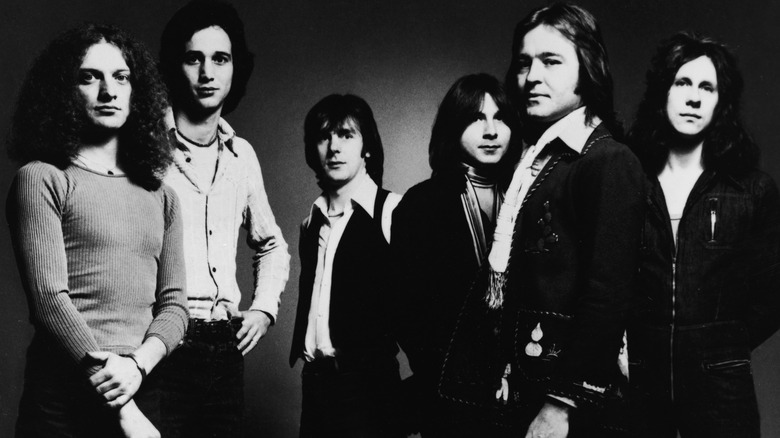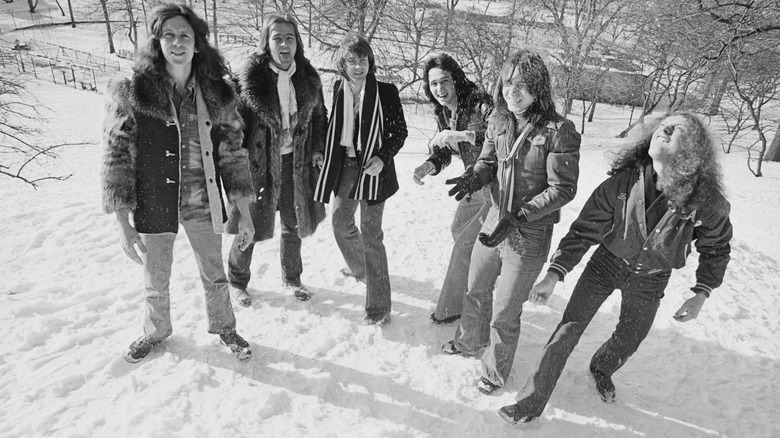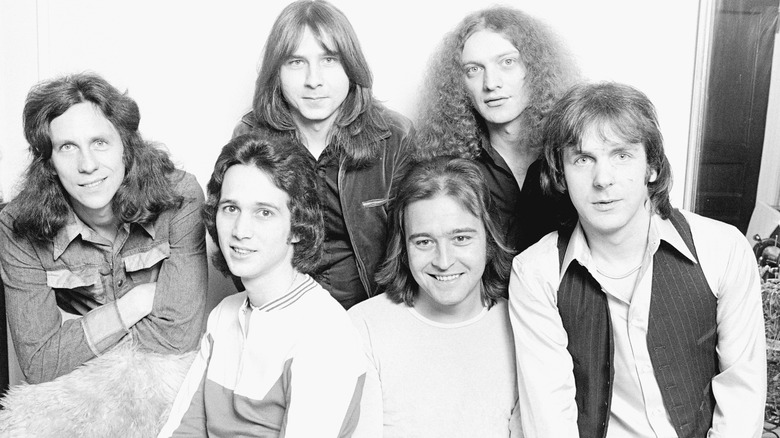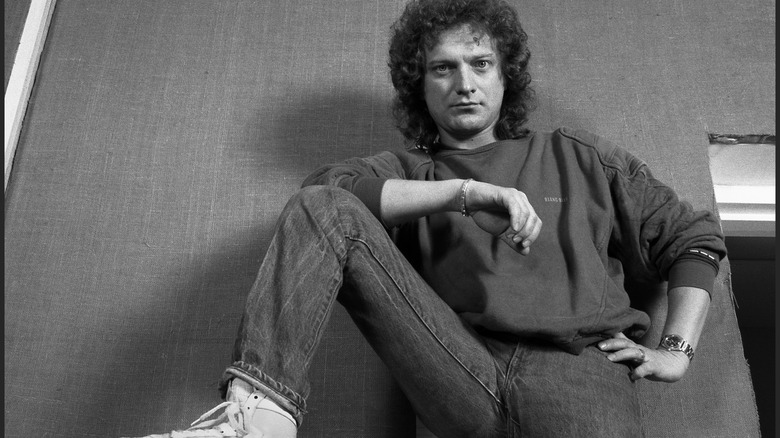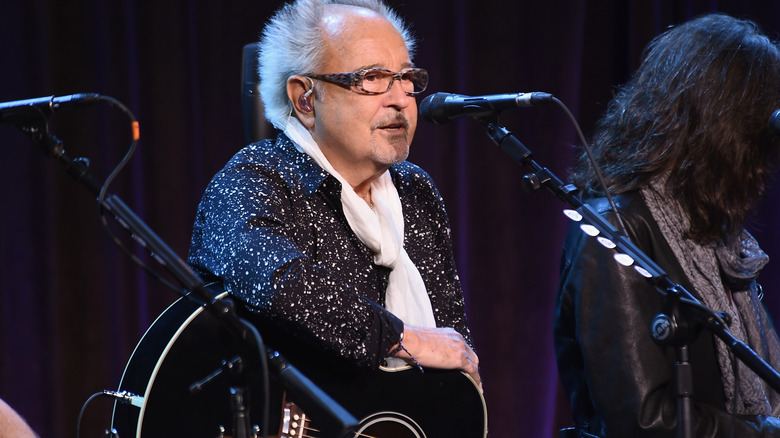The Untold Truth Of Foreigner
While most bands struggle to hit it big, fame worked a little bit differently for Foreigner: It happened immediately. According to Billboard, their very first album didn't just top charts — it went platinum a whopping five times.
Things only got bigger and better from there. By the time the group announced they were going to be staging a live performance of their album "4", it was 2022 and, according to Broadway World, their album sales had surpassed the 80 million-mark overall. "4" alone had been certified eight times platinum.
That means that everyone knows the songs: "Juke Box Hero." "Urgent." "Cold as Ice." "Hot Blooded." It wouldn't be out of line to suggest that pretty much everyone can sing along with those songs, whether they admit it or not. But here's the weird thing: Naming the members of Foreigner — with a few notable exceptions — is a little more difficult. There's Lou Gramm, who was the lead singer on a huge number of those hits. Then there's Mick Jones, who's credited as the band's founder. And then? It gets a little hazy, and there's a reason for that. Throughout Foreigner's wildly successful run, there have been more than 30 band members — including four different lead singers (via Business Jet Traveler). What gives? Let's talk about some of the lesser-known stories behind one of music's biggest bands.
Foreigner almost ended before it got started
If there's a driving force behind Foreigner, it's founder Mick Jones. In his autobiography, "A Foreigner's Tale," he told the story (via Louder Sound) of how he had come to a point in his life where his path could have diverged into two very different directions — and only one of them led to Foreigner. And the other?
He was a member of a group called Spooky Tooth, and when they started making headway in the U.S., they decided to move to New York. It was 1974, and Jones found himself living in Manhattan with a friend of the band's keyboard player. Things went sideways when Jones realized that his roommate hadn't been paying the rent with the money Jones had been handing over. They were evicted, and everything in their apartment was seized.
Jones saved a few of his guitars and a few changes of clothes, and that was it. He was homeless, and to make matters worse, Spooky Tooth had just recorded an album when the band disintegrated with the departure of the keyboardist.
Jones recalled that it was such a miserable time that he was looking at Plan B. He wrote: "I seriously considered returning to England and ... becoming a dentist."
Fortunately for music, he decided to stay in the business when Spooky Tooth's manager started his own label and asked Jones to be the big boss. He wasn't down with the corporate thing, but it did inspire him to form his own band.
There were a few things behind the name
Names are a big deal, and having a great name for a band is key. It has to look good on the merch, after all, and Foreigner is a great name... but it wasn't Mick Jones' first choice.
In his autobiography, "A Foreigner's Tale," he wrote (via Louder Sound) that he had most of the band assembled — including Al Greenwood, Ian McDonald, Ed Gagliardi, and Dennis Elliott — but they were still missing their lead singer. They did have a name, though, and it was Trigger.
It was an Atlantic Records executive who told them they really needed to come up with something else, so Jones went with Foreigner after being inspired by the makeup of the band. Of the six, there were three Brits and three Americans. Jones later explained (via Yahoo!): "The idea behind the name was that if we went to England, there'd be foreigners in the band, and if we were in America, there would be as well."
There was just one more thing that cemented the name, though: Jones said that nine was always his lucky number, and since the name had nine letters, the matter was settled.
Mick Jones had an accidental French career... kick-started with an affair
Mick Jones wrote in his autobiography, "A Foreigner's Tale" (via Louder Sound), that since there were so many inexperienced band members, he felt that he was going to have to be the one to shoulder most of the responsibility. He was only in his late 20s at the time, but he'd already had some wild experiences in the music scene.
In 2017, the San Francisco Examiner did a retrospective on his career — which started with a band called Nero and the Gladiators, whose members went onstage in full Roman centurion dress. In the 1960s, they were hired to go on tour as the backing band to a French singer named Dick Rivers, and they did — sort of. Jones started a fling with a woman traveling with the group, and it got him kicked off of the tour: The woman was Rivers' fiancée.
They stayed together, and Jones ended up joining another band and playing for Sylvie Vartan. It was during one of those shows that he was hit by the stage curtain, dropped his guitar, and started to swear... only to have someone come over, excited to hear his English accent. It was John Lennon — and that's when Jones started hanging out with the Beatles.
He also spent some time touring with the performer dubbed the "French Elvis," Johnny Hallyday. According to Classic Pop, Jones' band Spooky Tooth came post-France, and ultimately, pre-Foreigner. Experience? It's important.
The song with an otherworldly origin
Foreigner's "I Want To Know What Love Is" is an undeniably brilliant song, and according to what Mick Jones told Louder Sound, there's a good reason for that.
"I don't know where it came from. I consider it a gift that was sent through me. I think there was something bigger than me behind it. I'd say it was probably written entirely by a higher force."
At the time, it was 1984, and Jones had been involved in a divorce and was with a new partner. While things were going well for Foreigner on the outside, personal relationships within the band weren't great. That first night of developing the song — at around 3 a.m. — he came up with the chorus, a few chords, and the title, and he was excited enough to wake his future wife to tell her about it.
Strangely, that's not the only surreal experience that happened around the birth of the song. According to Jones, he had been looking for a way to "enhance [the song] in a spiritual way" — and when he heard an album from the New Jersey Mass Choir, the rest of the song immediately came together in his mind. Members of the choir went to the studio with the band, and something just wasn't working. Jones says it was only after the choir held hands and said the Lord's Prayer that they went on to nail it... in just one more take.
They wrote Juke Box Hero about a real fan... and tried to find him
Some songs are background noise, and some songs paint such a powerful picture in your mind that they're impossible to ignore — and "Juke Box Hero" is the latter. The image of someone standing in the rain, listening to the crowd, the music... it's no wonder it was based on very real events.
Mick Jones spoke with SongFacts and told the story: They were at a concert in Cincinnati and had gone to the arena for a pre-show sound check. Fans were gathered at the entrance, but when the band returned five hours later — in the pouring rain — there was just one guy still waiting. Jones explained what happened next: "I thought, well, he's waiting like five hours here, maybe we'll take him in and give him a glimpse of what happens backstage at a show.
"And this kid was just mesmerized with everything. ... And I just imagined what was going through his mind. ... That's how it originated."
The song appeared on their 1981 album "4" and went on to inspire a musical. According to Ultimate Classic Rock, it also inspired the band to look for that fan again — or at least one who's just as dedicated. In 2019, they kicked off a massive search for their personal juke box hero, offering him the backstage, VIP experience one more time.
Gramm and Jones were Hotel California'd... literally
The Eagles had a massive hit with their surreal "Hotel California," the place where visitors could check in... but never leave. That has a weird connection to Foreigner, because strangely, it was precisely that kind of hotel setup that got founder Mick Jones and lead singer Lou Gramm speaking again — albeit under some different circumstances.
Gramm had been the voice of Foreigner for a while when, in 1987, he put out a solo album that Jones thought sounded a bit too Foreigner-ish. Jones recalled (via Yahoo!) it brought up bad feelings they'd been able to overlook up to that point, and Gramm quit a few years later.
Fast forward to 1992: Jones was already in Los Angeles, and Gramm happened to be flying in. A rep at their record label arranged for them to meet in Jones' hotel room to talk, and it just happened to be the same day the LA riots kicked off. Gramm had just gotten to the hotel when they were locked down. "So we were stuck in this place — the Sunset Marquis — for like a week. ... We didn't have a choice," Jones said. "We had to see each other. Go to your room, you walk around, and you can't leave... [like] Hotel California."
They ended up reconciling, and Gramm rejoined. A few years later, bassist (for both Foreigner and Gramm as a solo artist) Bruce Turgon told the Las Vegas Sun that Gramm returning to the band was a "very satisfying next, logical step."
All that music was played on just a few guitars
It might be easy to assume that someone who plays guitars for a living — especially with a band that's sold tens of millions of records — has their share to choose from, but surprisingly, Mick Jones told Vintage Guitar that's not really the case. When he was asked about the guitars he's played on albums, in studios, and on tour, the answer is that there are only a few — and his favorite is long gone.
That, he says, was an ES-345 "almost identical to the one Chuck Berry played. It was a rich orange-red color — my favorite guitar. It was a real classic and had a lot of history. Unfortunately, it was stolen."
After that, he couldn't bring himself to get a near-identical replacement, and opted instead for a Les Paul. He ended up with two of those. All together, Jones says he has about 30 different guitars, ones that he only really picked up if they jumped out at him. Jones has told Gibson that his original Les Pauls don't go on tour anymore. Instead, he travels with less expensive instruments, such as a 1997 Tobacco 'burst Les Paul Standard or a replica of his Gibson signature guitar. But a different guitar for every show, and a wall of choices? Not really.
Lou Gramm became a born-again Christian
Everyone deals with fame differently, and for Lou Gramm, his way of handling it was to become a born-again Christian.
He spoke extensively about his faith to Cross Rhythms, saying that it was 1991 when he really started down his religious path. He explained: "I think that rock life and the traveling and everything that goes along with it had begun to get the better of me. I was not being the kind of person my parents raised me to be and I knew I was being overcome by drugs and alcohol and was at the point where there was nothing I could humanly do to stop it. And I tried time and time again."
His breaking point came after a concert at Madison Square Garden, and Gramm says he was so disappointed in who he had become that he simply prayed for the strength to become a better person. Things happened gradually, and it started with getting into a 30-day rehab program. The Christian facility convinced him that it was the right path for him, and when he left rehab, he told everyone he was "clean and sober and intended to stay that way."
Gramm said that while the rest of Foreigner was supportive, going on tour — and being exposed to all that went with it — was difficult. Still, he stuck with it, and in 2008, Billboard announced he was putting out his own Christian rock album.
If you or anyone you know is struggling with addiction issues, help is available. Visit the Substance Abuse and Mental Health Services Administration website or contact SAMHSA's National Helpline at 1-800-662-HELP (4357).
Lou Gramm was told that he was going to die
In the late 1990s, Lou Gramm suddenly found he was suffering from troubling symptoms, including headaches and sudden memory loss. According to the Las Vegas Sun, it was 1997 when he went to the doctor and got some horrifying news: It was an egg-sized tumor, with tentacles wrapping around his optic nerve and pituitary gland. Also? He was told it was inoperable.
Ultimately, Gramm was extremely fortunate: As he told the Toronto Sun, he found a surgeon in Boston who used lasers to remove the tumor — after other medical professionals advised him to "put [his] affairs in order" instead of seeking medical treatment.
What followed the surgery was a long recovery. Gramm has spoken candidly about his difficulties getting his medication right, and struggling with a pituitary gland now operating at about 30%. That led to a 100-pound weight gain that he described as causing "a tremendous backlash from fans who thought I was eating too much."
Fifteen years later, he spoke with the CTPost about the life-changing experience. Not only did he spend years unable to remember the songs he had been singing for decades, but, he said, "You really take stock of your life."
Heart surgery put life in focus for Mick Jones
In 2012, The Courier Mail ran a surprisingly brief article announcing that Foreigner's Mick Jones had undergone a type of heart surgery called an aortoiliac bypass. That, says the Society for Vascular Surgery, is a procedure where blood is rerouted around a defective or diseased artery, and it's not a first-resort sort of operation. Still, it was reported that he was recovering well — but in 2014, Jones opened up a little more about what he had been through.
"It was a very dark time for me," Jones told CBS News. "I literally didn't know where I was anymore. I didn't know who I was. I mean, I honestly never thought I'd play on stage again."
Jones went on to say that even though the guitar had been a part of his life for decades, one of the after-effects of the surgery was that he "lost the ability to play chords." He credited his brother for sitting down with him, putting a guitar in his hands, and reminding him that this was who he was — and that he knew how to do it. Along with his brother, Jones says it was his family, four children, and three stepchildren who were there for him, adding: "You just somehow try and hold on."
Foreigner isn't as much a band as a brand
Even those who aren't fans of, say, the Rolling Stones or the Beatles know names like Mick Jagger and John Lennon. Foreigner is a little different in that it's more about the entity than the individuals, and it's really no wonder. When Business Jet Traveler spoke with founder Mick Jones, they noted that he wrote, co-wrote, and co-produced pretty much every song. He's also the only member to have been involved with every album, and the only original member of the group left. Everything else has been a bit of a revolving door — and they asked him about it.
Jones describes Foreigner more as a brand: Rather than advertising the talents of individuals, it's about the collective sound. So, why the turnover?
Jones explained: "That came down through the dynamics between me and the lead singer at the time, Lou Gramm. We had a number of battles and usually in those battles some member of the band would suffer. That's a reason the band was very unsettled during that time — all the changes in personnel."
He added: "Whatever the changes have been, the band retains its identity."
